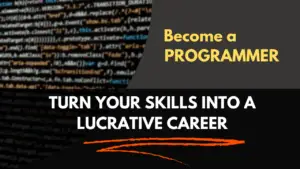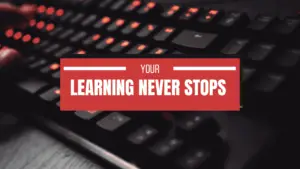Due to the development of technology, programming is regarded as one of the most popular professions in the world. If you wish to enter IT, switch to a better-paid job, or run your own company, learning programming languages offers unlimited possibilities. The best part? There is no requirement that you be an expert to start—anyone with effort, dedication, and a hunger to learn can become a programmer. And earning money is only the beginning of what you can do once you acquire those skills.
Thank you for reading this post, don't forget to subscribe!As the title of this article suggests, we will discuss not only the process of gaining programming skills but also what to do with these skills in order to establish several streams of income. Let us move on to the actions that will help you become a programmer and rid yourself of programming aspirations and financial woes in a single shot.”
Become a Programmer and Turn Your Skills into a Lucrative Career

Step 1: Choose Your Programming Language—The Cornerstone of Your Professional Life
You can compare programming languages to tools found in a toolbox. It is self-evident that diverse jobs necessitate the use of different instruments, and the language that you choose will determine what kinds of projects you’ll be able to undertake and what jobs you’ll be suited for. If you aspire to become a programmer, selecting the right language is crucial for your future success.
Starting With Language Learning: Where Should I Begin?
Any one of the following languages can be your starting point, depending on your career goals:
Python: This is one of the easiest programming languages for novices to learn. Because of its accessibility, simplicity, and ease of use, Python is regularly suggested as the first language to learn. Fields like data science, AI, web development, and automation make use of this language.
JavaScript: The heart of almost every website. If you are into front-end development (how a website looks) or full-stack development (design and code), then JavaScript is essential. This allows the creation of rich internet applications thanks to frameworks such as React, Angular, and Node.js.
Java: On the other hand, for Android app development or building large-scale enterprise systems, Java would suit you. It is highly sought after and used by most large companies.
Swift: If you want to create apps that run on Apple devices or any Apple-oriented projects, the way forward is Swift. Highly robust and relatively new, the Swift programming language has been designed to work in harmony with any Apple-based ecosystem.
Allow your interests to steer your choice of programming language. You can always change it in the future, but starting with a language you want to work with will be helpful in assisting you in developing your career.
Step 2: Master the Core Concepts—above all, Integrate them Effectively
In programming, one builds a program or a part in the same way as one would build a house. The solidity of the structure is generally based on the strength of the foundation in the coming years. But before getting into complex exercises, one needs to learn the nitty-gritty of coding. These concepts are the ideas that will stay with you across all languages and frameworks you use in the future.
Concepts that are considered core:
Variables and Data Types: The building blocks of all programs. Understanding how information is captured and manipulated is imperative.
Control Flow (Loops, Conditionals): Control your program’s flow with loops and conditionals. This allows you to iterate over tasks and control the process based on defined parameters.
Functions: It is more convenient to use pieces of code repeatedly without rewriting them several times. Understanding and mastering functions will enable you to structure your code efficiently.
Data Structures: Arrays, lists, dictionaries, and sets should all be part of your learning. These structures promote the organization of information in ways that enable easy and quick retrieval and manipulation of data.
Algorithms: An algorithm is a set of actions or rules applied to obtain a response or a given result in computing. If you know the basics of algorithms (sorting, searching), you can progress to more advanced programming challenges.
Ensure to commit these concepts to your mind, as they are going to be functional in all the future projects one embarks upon and the problems they will tackle.
Step 3: Application of Knowledge—Implementation of the Theory through the Creation of Real-world Projects
The concepts of the theory are significant, but the implementation brings about adequate clarity in all aspects. To truly become a programmer, it’s essential to not just understand the theory but also apply it through practice. Now that you’ve grasped the essentials, you should start doing small projects in order to build your knowledge and also gain some practical experience. This hands-on approach will solidify your understanding and help you become a programmer in a more effective way.
Commence with Projects of Low Technicalities:
To-Do List App: An application that users of this app can add tasks to that can be removed or marked as completed. This will assist you in practicing utilizing lists as well as input from the users.
Personal Portfolio Website: This project will assist you in building a webpage that you may use as a career portfolio by displaying your work. It is crucial for fostering your capacity to expand your reach on the internet.
A weather app is an application that uses an API to update weather conditions based on outside data. This will familiarise you with the use of external APIs and the process of introducing external resources.
Essential Advantages of Project Building
Practical knowledge: It’s one thing to read about theoretical concepts but quite another to bring life to such ideas by writing code.
Portfolio: Your projects are now part of a portfolio, including most of the skills you possess that an employer may be looking for or a client who wants the service.
Problem-Solving: As you develop each of these projects, there will be hurdles that require out-of-the-box thinking and enhancement of your coding skills.
Step 4: Freelancing and acquiring age experience

Of course, learning and building projects are important, but nothing comes close to experience. Being a freelancer gives you great work experience and, at the same time, money. When you decide to become a programmer, you can gain practical experience even with limited skills. There are a myriad of beginner tasks on freelance platforms that offer people a way to start building their credentials.
Common Freelance Tasks:
Upwork: One of the largest freelancing websites. Make a profile, market yourself, and begin bidding on the projects of your liking.
Fiverr: A website where people offer to complete general tasks for a set price. If you are new, you may start by performing simple services, like fixing minor website bugs or developing web pages.
Freelancer: Similar to Upwork, it is also helpful in securing freelance work and has a range of projects that are easy to challenge.
Freelancing tips:
Start Small: Always offer services that correspond with your skill level. The more reputable you become, the more you will increase your prices and accept more complicated tasks.
Build Your Portfolio: Fundamental projects can help you showcase your abilities. This will help you attract potential clients; therefore, having a portfolio is beneficial.
Communication: Be tactful in your conversations. Use discretion when speaking with clients for the first time in a bid to win projects and to maintain clients in the long run.
Besides being a source of income, freelancing benefits the individual in that it teaches them how to communicate with clients, work on assignments, and adhere to deadlines. If you’re looking to become a programmer, freelancing provides an excellent opportunity to gain real-world experience while honing your skills.
Step 5: Look for an employment opportunity or a contract.
After you gain some confidence in your programming skills, you can become a programmer and start looking for jobs in the tech sector. Whether you’re freelancing or applying for full-time roles, the opportunities are endless for those who choose to become a programmer.
Valuable Sites for Job Search:
LinkedIn: One of the best jobs and networking platforms. All employers post their vacancies here.
Indeed: An effective job-finding site that lists thousands of programming jobs across the globe.
Glassdoor: You can find job openings, as well as check for reviews and pay amounts for the company.
How to prepare for a job interview:
Technical Interview: An example would be using LeetCode or Interview Cake to practice coding problems. Pay close attention to the material covered in problem-solving and data structure classes.
Behavioral interview: A discussion of the portfolio and how you performed similar tasks. The answers to these questions give the employer perspective on the applicant’s character and attitude towards work.
Your first permanent job role as a programmer might involve a lot of waiting, although once you secure the position, there is ample potential for learning and growth as part of the team.
Step 6: Scale Your Income—Create Multiple Revenue Streams
With your programming abilities improved, it is time to become a programmer and scale the business to the next level. The opportunities for making money as a programmer are plentiful.
Ways to Scale Your Income:
Create Digital Products: There is demand for software, apps, or tools in the market, which one can create and sell. It could be a productivity application, a gaming app, or even a service that helps in addressing a particular need.
Teach Others: You can author courses or instructional videos and upload them on sites such as Udemy or Skillshare. If you can teach or show a different way of doing and learning things, there’s an opportunity out there.
Start a blog or YouTube channel: Share what you know and have experienced. You will be able to monetise your content through advertisements, sponsorship deals, or affiliate marketing platforms once the audience is engaged.
Write E-books: Some people master the art of calmness. If that is you, get out there and write e-books explaining programming, hot trends in technology, or even specific programming languages.
Passive Income Potential:
After achieving passive income-generating content or digital products, most creative or high-level work can now be undertaken. This makes it worthwhile as the initial work done continues to earn income while one is engaged in other activities.
Step 7: Your Learning Never Stops

As much as there are advancements in technology, so must you! To become a programmer is to learn, and learning leads to earning, and in this case, it’s a lot of earning. Technology moves quickly, and keeping up with the trends is important to remain in the market scene.
Expand your knowledge: As soon as you have mastered the starting level, you can start exploring other areas, such as machine learning, cloud services, blockchain, and DevOps, among others.
Engage in conferences: There are networking opportunities at conferences and other meetups. You can meet like-minded individuals and industry experts and gain first-hand information on current happenings in the industry.
Join Other Developers: Get involved in open-source projects or work with other developers on more extensive and complicated systems.
Conclusion: The Path Towards Becoming a Programmer and Making Money
Making it as a programmer and earning a living from the skill is a complex path. To become a programmer, it takes commitment, perseverance, and an adaptable mind. However, when approached correctly, programming can be quite a gratifying and rewarding journey.
First, select a programming language, learn its basics, and apply it to actual projects. Then, practice this skill by either offering your services as a freelancer or securing a job. Focus on how to grow your earnings by also having multiple income streams. As you continue to learn and improve, you will not experience stagnation in your programming career and will steadily become a programmer.
Programmers always have opportunities. If you are dedicated and put your heart and soul into strategizing, you will be able to earn well while doing what you love most: writing code. With persistence and passion, you will become a programmer who thrives in the field.
